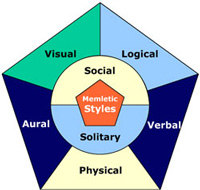 |
|
 |
The Aural (Auditory-Musical-Rhythmic) Learning Style
If you use the aural style, you like to work with sound and music. You
have a good sense of pitch and rhythm. You typically can sing, play a
musical instrument, or identify the sounds of different instruments. Certain
music invokes strong emotions. You notice the music playing in the
background of movies, TV shows and other media. You often find yourself
humming or tapping a song or jingle, or a theme or jingle pops into your
head without prompting.
Common Pursuits and Phrases
Some pursuits that use the aural style are playing, conducting, or
composing music, and sound engineering (mixing and audiovisual work).
You may tend to use phrases like these:
- That sounds about right.
- That rings a bell.
- It's coming through loud and clear.
- Tune in to what I'm saying
- Clear as a bell.
- That's music to my ears.
Learning and Techniques
-
If you are an aural learner, use sound, rhyme, and music in your
learning. Focus on using aural content in your association and
visualization.
-
Use sound recordings to provide a background and help you get into
visualizations. For example, use a recording of an aircraft engine running
normally, playing loudly via a headset, to practice flight procedures. Use a
recording of the sound of wind and water when visualizing sailing maneuvers.
If you don't have these recordings, consider creating them while next out
training.
-
When creating mnemonics or acrostics, make the most of rhythm and rhyme,
or set them to a jingle or part of a song.
-
Use the anchoring technique to recall various states that music invokes
in you. If you have some particular music or song that makes you want to
'take on the world,' play it back and anchor your emotions and state. When
you need the boost, you can easily recall the state without needing the
music.
|
 |

